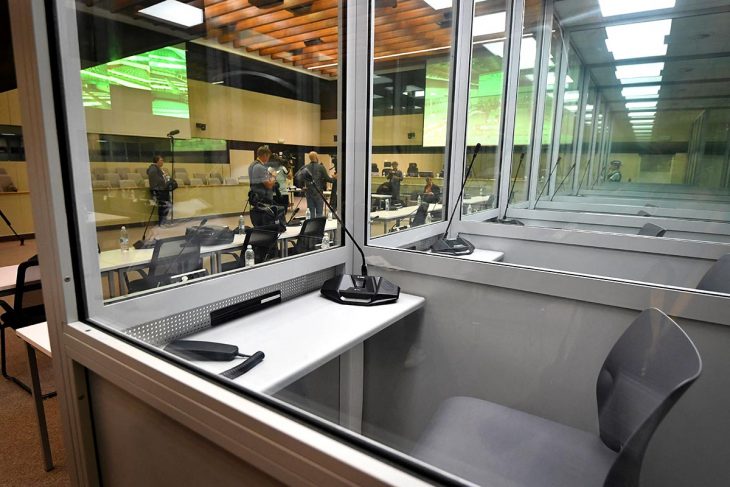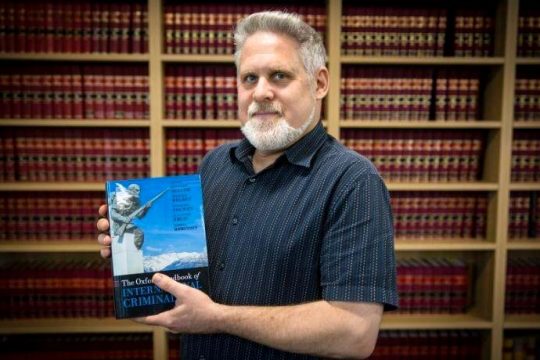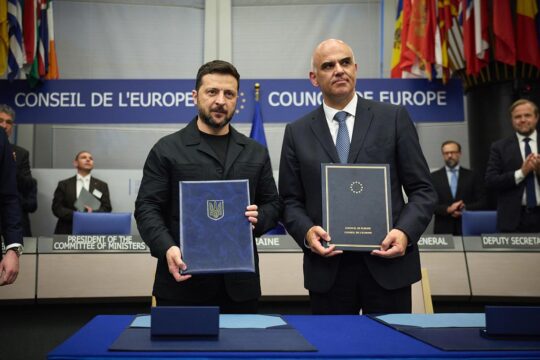There has been much recent debate around the possibility of a “Nuremberg for Ukraine”. The International Military Tribunal (1945-46) set up by the victorious Allies in Nuremberg, Germany, after the Second World War is so far the only international court to have tried crimes of aggression (called “crimes against peace” at Nuremberg). And it did try one person, Nazi Party secretary Martin Bormann, in his absence and sentenced him to death (he was thought to be on the run, but was in fact already dead). However, international criminal law standards have evolved, and since then the only international court with a mandate to hold in-absentia trials is the Special Tribunal for Lebanon (STL), which has cost a lot of money for “second best justice”.
“As soon as I heard there was a reflection on this special tribunal for Russia, I got together with a group of other jurists to say it was time to introduce in-absentia procedures not only in this tribunal but also at the International Criminal Court (ICC),” says French lawyer François Roux, who has headed the Defence Office at the STL and also served as a defence lawyer at other international criminal tribunals. While stressing that in-absentia trials are not “the best solution”, he says they are important for victims and “better than doing nothing”.
But Sarah Bafadhel, an international criminal lawyer attached to 9BR Chambers in the UK, is not keen on the idea. “If the idea is to stop the [Ukraine] conflict or get the perpetrators behind bars, obviously trials in absentia are not going to help,” she told Justice Info. “If the idea is for victims to be heard, to collect the evidence, then you question whether other modalities are more useful, particularly if we're trying to go ahead with peace talks. And I think having a tribunal trying a sitting head of State won't help peace talks.”
Historical record and a voice for victims
“Major perpetrators of international crimes are very often protected, and many of these crimes are State crimes to begin with,” says Robert Roth, an honorary professor of international criminal law at the University of Geneva and former judge at the STL before he resigned in September 2013. “State agents who perpetrate State crimes are persons who are protected by the State, especially when they are prosecuted.”
This could be a reason to hold in-absentia trials, he told Justice Info. The rationale applies to Russia, but it was also part of the reason for the in-absentia trials at the STL, set up in 2009 to prosecute those responsible for the 2005 bombing that killed former Lebanese President Rafik Hariri. Syria was suspected of being behind the attack, and the dictatorship of Syrian President Bashar Al-Assad seemed firmly in place at the time, before the Syrian war. So there was an expectation that the tribunal might not get its hands on the top perpetrators, says Roth. That turned out to be the case. It didn’t even manage to indict them, and ended up convicting a handful of Lebanese Hezbollah operatives – all in absentia. It also took more than a decade.
But while the STL was imperfect, he says in-absentia trials do have certain advantages. “It's a little bit like the glass which is half-full or half-empty,” Roth says. “If it is half-empty, there is no accused person before the tribunal, and nobody would serve any sentence. If you concede that the glass is half-full, at least you have a judicial assessment of what happened, which is important for history and for the victims.”
Roux agrees on the importance for victims. “The best witnesses to the positive aspects of in-absentia trials are the Lebanese victims who, for the first time in the history of international justice since Nuremberg, were able to come before a judge, even if no accused person was present,” he says.
Bafadhel thinks other mechanisms might be more appropriate. She points, for example, to truth commissions such as the one in South Africa and to a rule (Rule 61, “Procedure in Case of Failure to Execute a Warrant of Arrest”) in the Statute of the International Criminal Tribunal for the former Yugoslavia (ICTY), which – while the tribunal did not allow in-absentia trials – allowed evidence and victims to be heard by the court before the accused had been arrested. It was used in the cases of former Bosnian Serb leader Radovan Karadzic and Bosnian Serb military leader Ratko Mladic, who were only arrested later. These hearings were much shorter – from June 27 to July 8 1996 – than the extremely expensive full trials held at the STL over years.
Questions of legitimacy
She is also concerned that in-absentia trials would further undermine the legitimacy of any special tribunal for Russia, as this could play into the Russian narrative of a “kangaroo court”. “This notion that a select number of states can establish a tribunal to target another state, you question the legitimacy of that process, and I think in-absentia trials will necessarily take away from that,” she says, “because when you think of in-absentia trials there is a notion of unfairness, that you have a criminal trial and the accused is not present.”
Roth shares her concerns about the legitimacy of such a court. “Without the support of major States, it would be like the mice versus the elephants,” he says. “Who would be the mice? Probably the most important would be Germany if they agreed on this. Otherwise Ukraine, Poland, the Baltic States, perhaps Switzerland and Scandinavian countries. Perhaps some African countries would come on board, but that’s not certain. And that's it.”
European Commission President Ursula von der Leyen came out in favour in November. On January 19, the European Parliament voted a resolution urging the creation of such a tribunal. "MEPs urge the EU, in close cooperation with Ukraine and the international community, to push for the creation of a special international tribunal to prosecute Russia's political and military leadership and its allies,” said the European Parliament. A draft resolution is also reportedly circulating at the United Nations, to be brought before the General Assembly. If the idea were to be submitted to the UN’s top body, the Security Council, it would almost certainly be vetoed by Russia and China.
The theoretical right to a retrial
Experts point out that according to international criminal law, persons convicted in absentia have a right to demand a re-trial if they subsequently hand themselves over to the court or are arrested. So aren’t in-absentia trials just a big waste of money? No, says Roux, and yes says Bafhadel. In addition, she says that in the case of the STL, where she also served as a defence lawyer, that right was only theoretical.
“The STL is now largely closed down,” she continues. “It is just a residual kind of shell of itself. If an accused turned up now, there is no money to have a retrial, and they would not be able to have any retrial in Lebanon because of the way the rules were set up.” She points out that international tribunals are expensive to run and often have budget issues. “If you're wasting that money with the initial in-absentia trial, you will then run out of money for any re-trial,” she warns.
Taking the STL Statute and improving on its weaknesses
Roux shares concerns about the weaknesses of the STL, including the amount of time it took to conclude all its in-absentia trials. “The trials should have taken months, but they took years,” he says. “The idea of in-absentia should be fast trials that give a voice to victims, that allow the prosecutors to present evidence, and the judges to form an opinion. That can be done in a few months, and it doesn’t cost much money.” He says the slowness of international criminal tribunals is “scandalous” and needs to be tackled.
Bafadhel stresses that at the STL, “because there's no accused in jail, there was no kind of rush to get things done because there was no urgency or potential that a person could be released. So I think it gave people too much comfort, with really long, academic discussions in court.”
Roux still believes that the Statute of the STL could serve as a future model. “My advice would be to take the Statute of the Tribunal for Lebanon, and its Rules of Procedure and Evidence. They are both very good, there’s no point in writing things all over again. But if ever we create another international tribunal with that kind of mandate, we need to correct the STL’s imperfections.”








